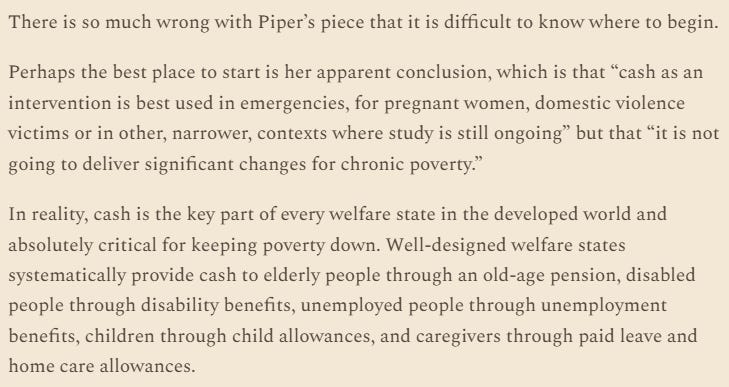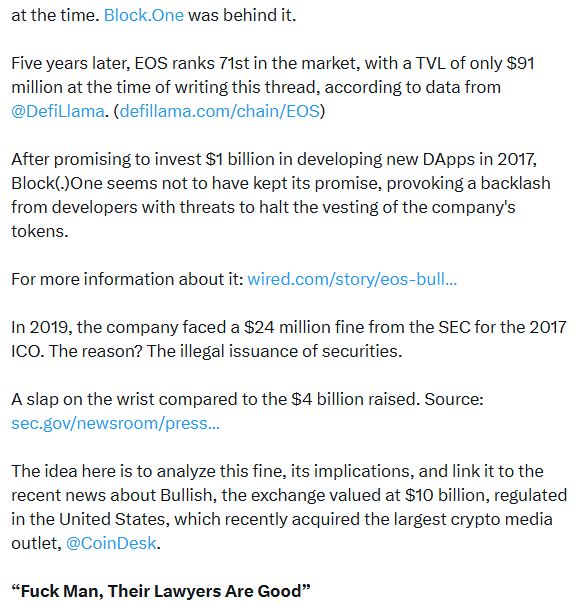Effective Altruism In a Skinsuit: "The Argument" is Laundering Austerity
Also: Bullish on Fraud; No trial for Do Kwon; the LIBRA snipers scam Kanye West; SafeMoon property seizures; and More.
Welcome to your weekly Dark Markets fraud n’ grift roundup. If you’ve ever considered subscribing, now is a *fantastic* time: after a slow summer, we’ll have some big paywalled pieces coming up - one of them previewed below.
The launch of new “liberal” news outlet The Argument has been unambiguously hilarious, fundamentally because most of their marquee writers, particularly Matt Yglesias and Kelsey Piper, are not so much “liberal” in any commonly understood American sense as “center-right-to-secretly-eugenicist.” Piper and Yglesias are both formerly tied to Vox, and The Argument also features Derek Thompson as a staff writer - Ezra Klein’s partner in the ideologically very similar “Abundance Liberalism” project, which is largely about co-opting right-wing deregulation rhetoric.
When you look at the funding for The Argument it becomes very clear why this “liberal” publication is devoted to undermining the case for a welfare state. The Argument is primarily funded and staffed, not by “liberals,” but by a mix of Effective Altruists like Dustin Moskovitz strategically shifting away from that brand after the FTX debacle showed its strategic and ideological emptiness; and entities tied to far-right funding sources including Peter Thiel and the Koch Brothers. This is “liberalism” in 2025.
If you know Yglesias and Piper, you know their entire shtick is maintaining a strategic ignorance that serves their ideological aims. That was painfully highlighted in a fight that immediately developed thanks to the inclusion of at least one genuine progressive writer, Matt Breunig, who took issue with Piper’s first piece, which was phrased in opposition of “cash transfers,” but directionally served the tech-right’s newly unmasked opposition to any sort of welfare state or wealth redistribution whatsoever. Breunig convincingly argues that Piper is wrong not just on ideology, but on results.
Semafor’s report on the funding sources for The Argument is invaluable for understanding the deeper forces behind this weirdness, but it needs some unpacking.
Open Philanthropy is funded primarily by Dustin Moskovitz, the lesser-known Facebook cofounder, who was the primary funder of the entire Effective Altruism movement before he was briefly supplanted by Sam Bankman-Fried and his stolen money. There’s Tyler Cowen’s Emergent Ventures, part of the Mercatus Institute, which has received funding from and has ties to both Peter Thiel and the Koch Brothers. There’s Patrick Collison of Stripe, who has collaborated with Tyler Cowen and also funds another futurist publication, Works in Progress, which some critics have described as substantially right-wing.
Edit: There’s one final key point here: this fundraising is not actually in the form of donations to a nonprofit, aside from the Emergent Ventures money, which is described as a grant. Instead, The Argument is primarily being funded as a startup: the above inputs add up to $4 million, and this (checks notes) Substack Newsletter is being valued at $20 million, pre-revenue. There is no real indication that The Argument will try any kind of new business model for journalism, so these “investments” all seem destined for a writedown … or some sort of simulated “buyout” from another bucket to make them all look like geniuses.
I omitted this from the email version of this newsletter out of haste. Apologies!
Yudkowsky + Piper Eugenics Fan Fiction
In the course of all of this, a pseudonymous account highlighted the fact that Kelsey Piper had, at some point not really all that long ago, co-authored a quite noticeably eugenics-themed Dungeons and Dragons fan-fiction with Eliezer Yudkowsky. It is titled "Mad Investor Chaos and the Woman of Asmodeus," and was seemingly improvised across comment threads by Piper and Yudkowsky. It includes a protagonist interested in selling his superior sperm to women or maybe use for a one-man eugenics campaign to raise the global IQ level (years before Elon Musk actually did this IRL). It lionizes Peter Thiel,
The funniest thing about the ensuing debate is all the people going “oh you think references to the INT statistic is racist, that’s so dumb” when the ugly truth is all these nerds are racists exactly because their simplified worldview is based on the idea that D&D is more or less how humans and the world work, because these people are the ultimate “stupid people cosplaying as smart.” If you need more direct evidence, Piper has continued playing defense for Scott Alexander, who much like Richard Hanania has learned to stop talking about the race science he completely believes in, but also as recently as January was approvingly citing debunked and racist “national IQ studies.”
These people are who they say they are.
Bullish, CoinDesk, and the EOS Grift
I’ve written before about the bad human beings who bought CoinDesk, as part of what, it’s now clear, was little more than a campaign to clean up their image ahead of an IPO. Bullish’ stock offering did indeed go nuts, and this has renewed interest in the poisoned roots of the entire organization in what I think is fair to describe as a $4 billion rug-pull: the 2018-2019 EOS crowdsale.
That animating spirit of fraud and graft is continuing in the operation of the exchange, which according to analyst David Wang shows signs of wash trading in its volume statistics, among other major red flags like a total lack of positive cash flow.
The short-run grifter mindset was also certainly reflected in Bullish’ decision, as new owners of CoinDesk, to turn it into a pay-to-play outlet that printed only what advertisers approved of. What was just two years ago indisputably the leading news outlet in the sector is, at a moment when that sector is booming, a shell of itself with an upside almost entirely limited to running sponsored content for nickels.
Word on the street is that with the IPO over, Bullish is now looking to unload CoinDesk after pretending for a time that they would flip it into some kind of retail-focused exchange. It will almost certainly get less than the $75 million it reportedly paid for the outlet, whose senior editorial staff has departed (or been released) en masse.
I’ll be doing my own writeup (and/or podcast?) about it all soon, but for now we have this very useful but underseen post from Artem Oak running down the path from EOS to Block.One through Peter Thiel to Bullish.
LIBRA snipers steal $12M from Kanye West YZY Coin
Way back in February I wrote about Hayden Davis and Kelsier Ventures, the family-run industrialized crypto fraud ring that ran the LIBRA token launch that got Argentinian President Javier Milei threatened with impeachment.
(I have a large feature about this forthcoming in Use Case Magazine, which you can sign up here to be notified about when it drops.)
Now Davis and his fam seem to have applied that philosophy to YZY, a memecoin launched (in some sense) by Kanye West. According to reputable on-chain analyst Bubblemaps, wallets connected to Hayden Davis sniped the coin’s launch - essentially a form of automated front-running that lets an early meme buyer “dump” on later entrants. It’s unclear how Davis might have had insider knowledge, but his activities early this year revealed definitively that memecoins are largely launched by a network of insiders who snipe each other’s launches rampantly.
No Trial for Do Kwon
This one hurts. I was very much looking forward to watching the trial of Do Kwon, the psychotically egotistical Stanford grad who destroyed $40 billion in notional value with his absolutely brain-dead financial perpetual motion machine Luna. Instead, after his flight to Montenegro and his many wonderful adventures since, Kwon has pleaded guilty to fraud charges.
While he’s on the hook for a potential 25 years in prison, prosecutors say they’ll ask for no more than 12. It’s a hilarious punchline for Sam Bankman-Fried, a fraudster of similar scale who rode his grandiose self-delusion through an extended criminal trial and wound up sentenced to 25 years for his efforts.
SafeMoon’s John Karony Had a Seizure
Speaking of egotists getting screwed by their own delusions, former SafeMoon CEO John Karony got petarded last week in property-seizure proceedings following his criminal fraud conviction in May. Nicholas Smith, the state-paid lawyer whose defense of Karony I found surprisingly solid under the circumstances, describes in a new filing that prosecutors did not seize all of Karony’s property before or during his trial.
Then, when Karony filed a motion to access about $4.3 million in cash and assets to pay counsel during his upcoming sentencing. In response, the government finally moved to seize that property. Smith argues this is contrary to due process, which I find highly credible …
But it’s still incredibly funny that Karony thought he would get to keep and use millions of dollars from his fraud, and basically seems to have reminded the government that they forgot to take it from him. The letter is very much worth a read for its comedic beats alone. Meanwhile, Karony’s sentencing has been scheduled for October 31. I’ll try to attend.
Book: The AI Con
I’ve just come across The AI Con, a recent book that joins the rising chorus of voices casting doubt on the supposedly imminent AI transcendence/apocalypse. Though the authors are a sociologist (Alex Hanna) and a linguist (Emily Bender), it is not primarily a deep exploration of the relationship between weighted decision trees and human communication. It’s a bit more of a populist diatribe, marked by sarcasm and snark. You can find a deeper dive in this review at The Guardian, but the book itself is pretty breezy.





![The AI Con: How to Fight Big Tech's Hype and Create the Future We Want [Book] The AI Con: How to Fight Big Tech's Hype and Create the Future We Want [Book]](https://substackcdn.com/image/fetch/$s_!anUP!,w_1456,c_limit,f_auto,q_auto:good,fl_progressive:steep/https%3A%2F%2Fsubstack-post-media.s3.amazonaws.com%2Fpublic%2Fimages%2F15998095-d199-4149-9ce1-2bf933ed0a71_350x538.jpeg)
https://mena.news/the-dark-side-of-kris-marszalek-crypto-com-ceo/
Interestingly, I read the linked above article, after wondering why in the world CRO would ever pump, just the day before I read this substack post about Bullish and EOS. I know nothing about mena.news, but the article's content seemed credible. The two articles are spookily similar. ICO, rug pull, move on like it never happened, never make it right, instead associate with fraudsters for whom access to a black-box cex is definitely appealing, and for whom perpetrating a possible fraud isn't a red flag but a resume booster.
Crypto.com was called out the same as FTX in DZM's Stadium Curse article: https://www.coindesk.com/business/2021/11/17/ftx-cryptocom-and-the-stadium-curse . But while SBF loves to yap, the crypto.com CEO is quiet, nondescript,and pretty much unknown among cex CEOs. He's a bit like Peter Thiel in that way. Like a black hole. Quietly amassing in size while being nearly invisible. You’d only know of its existence by noticing that you no longer see the light from anything it is now in front of. Slowly accreting into a gigantic force while no one was looking until its world-ripping-apart gravitational pull is impossible to ignore.
Perhaps the only part of that metaphor Thiel would have a problem with is the word “black.”